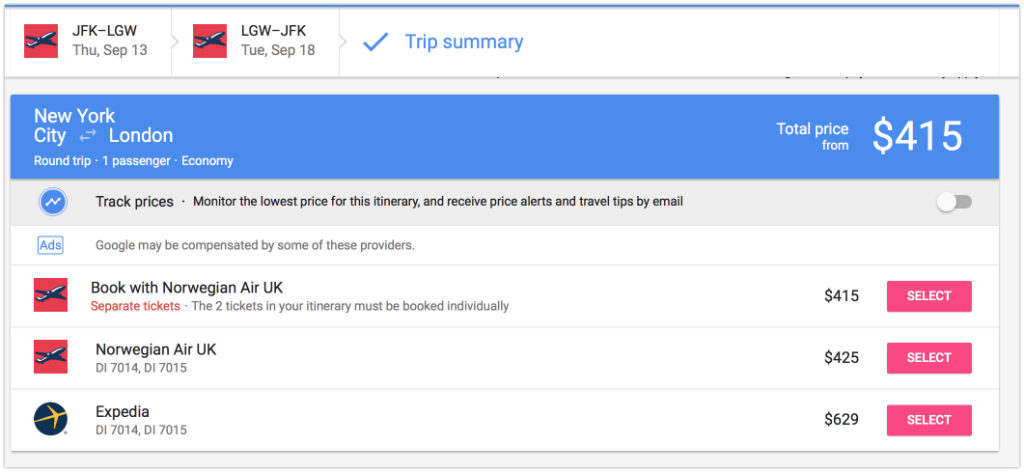Airlines are increasingly charging frequent flyers to redeem earned miles for flights. The additional charges go by many names, including fuel surcharges, but under many measures they appear to function just like cash fares.
In ancient times, airlines gave their frequent flyers completely free tickets. For every certain number of miles flown, travelers got a flight that was entirely on the house.
Today, that never happens, at least for flyers in the U.S. and Europe. Those looking to cash in on their loyalty to airlines (or banks vis-a-vis credit card point transfers) get hit with a bill. Sometimes that bill is limited to a tax transfer, other times it’s enough to pay for a cash ticket to the same destination.


It costs less to buy a cash nonstop ticket than to redeem 65,000 British Airways Avios frequent flyer miles for nonstop travel between New York and London in September. Image by Google Flights.
Airlines have clouded this programatic change in foggy language — commonly “fuel surcharges” or “carrier-imposed fees” — that the travel reporting community has, for the most part, swallowed whole.
WSJ: The Airline Fee That Exists For No Apparent Reason
A brief analysis published last week by the Wall Street Journal revealed something that insiders have long known: there is no fuel basis for “fuel surcharges.” When analyzed across regions, destinations and continents, airlines appear to treat these surcharges as fluidly as they do cash tickets. They charge different surcharges for the same flight depending on the direction of travel. Different connections and origins on routes of similar distance are priced differently.
Fuel surcharges appear to fluctuate depending on what the airline thinks customers are willing to pay. In other words, they are fares.
“Surcharges typically don’t change how much tax a traveler pays on cash tickets. And it doesn’t impact how many frequent-flier miles you collect for a flight on an airline that pays out miles by price instead of distance.”
The most generous programs, like Southwest Rapid Rewards and United MileagePlus, don’t add so-called fuel surcharges (fares) to tickets even when their partner airlines do. American Airlines AAdvantage and Delta SkyMiles programs don’t charge these fares on their own award tickets, but do pass the cost along when flights are operated by partners, like Air France or British Airways, that do add cash fares to awards.
Airlines have also experimented with shifting external costs to frequent flyer award redemptions, like landing fees or departure fees, by tacking them onto award tickets. Even the most generous programs have transferred some costs to frequent flyers redeeming their built up loyalty miles. At a minimum, U.S. flyers pay a $5.60 fee — which covers security charges federally imposed after Sept. 11, 2001 — in addition to the required miles to score a free ticket.
That 9/11 security charge is relatively new and instantly recognizeable to most any U.S. citizen. The visceral connection to Sept. 11 makes the tax feel justified. But airlines have always had to pay government imposed gate and landing fees, air traffic control surcharges and other seat-mile related taxes and fees. In the past, those levies were not shifted onto frequent flyers.
Lufthansa, as The Journal points out, will pay taxes and fees on an award ticket, allowing a flyer to get on a plane without opening their wallet, but the airline charges an additional 15,000 miles to do so.
Regulators have made some attempts at restricting how airlines can market fuel surcharges, at least when added into cash tickets, and should demand more transparent language.
Until then, the travel community can take a step for them. When airlines collect revenue on award tickets, let’s call it what it is: a fare.
The responses below are not provided or commissioned by the bank advertiser. Responses have not been reviewed, approved or otherwise endorsed by the bank advertiser. It is not the bank advertiser's responsibility to ensure all posts and/or questions are answered.
1 comment
Hotels are much worse but these one ways FROM Europe are a joke, specially in premium cabins.